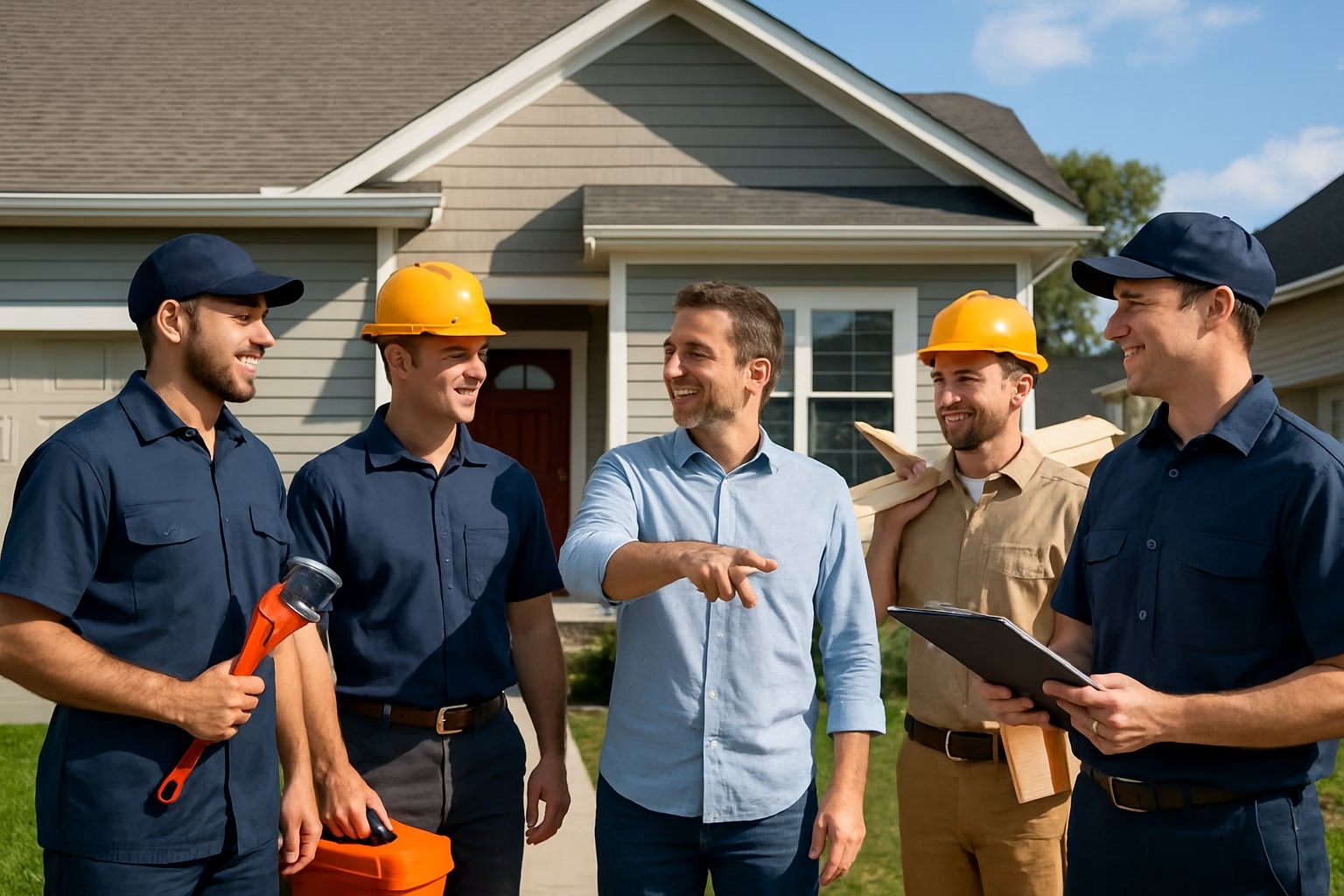When a pipe bursts or a light switch stops working, new homeowners often panic about who to call for help.
Unlike renting, where the landlord handles repairs, homeowners must find the right professional for each job.
The key to successful home repairs is matching the right type of professional to the specific problem—from handymen for small fixes to licensed specialists for complex work.

Different repairs need different experts. A leaky faucet might only need a handyman.
But rewiring electrical outlets? That’s a job for a licensed electrician.
Major structural work calls for a general contractor who can manage the whole project.
Knowing these differences saves you time, money, and a whole bunch of headaches down the line.
Choosing the wrong person for a repair can lead to poor work and expensive fixes later.
Smart homeowners learn to identify which professional fits their specific repair needs.
Key Takeaways
- Match each repair to the right professional based on complexity and safety requirements.
- Licensed specialists are needed for electrical, plumbing, and structural work; handymen handle minor fixes.
- Always verify licensing, insurance, and references before hiring anyone for home repairs.
Understanding the Types of Home Repair Professionals
Different home repair professionals handle different types of work. Choosing the right one depends on the job’s complexity and legal requirements.
Licensed professionals must handle specialized work like electrical and plumbing. Handymen can tackle general maintenance tasks.
Handyman vs. Specialist: Who Does What?
A handyman takes care of basic home repairs and maintenance that don’t require special licenses.
They fix leaky faucets, patch drywall, replace light fixtures, and do minor repairs around the house.
Handyman services include:
- Basic plumbing repairs
- Simple electrical fixes
- Drywall patching
- Door and window repairs
- Small carpentry projects
- Appliance repairs
Specialists focus on specific areas and have advanced training. An electrician handles complex wiring, while a plumber manages major pipe work.
Roofers deal with roof repairs and replacement.
When to choose specialists:
- Major electrical work
- Complex plumbing issues
- Structural repairs
- HVAC system problems
- Roofing projects
Most home improvement projects under $500 work well with a handyman. Anything involving permits or safety risks? You’ll want a specialist.
Licensed vs. Unlicensed Professionals
Licensed professionals have passed tests and meet state requirements. They carry insurance and know building codes.
This protects you from liability and helps ensure quality work.
Licensed professionals must handle:
- Electrical work beyond basic fixtures
- Major plumbing repairs
- Structural changes
- HVAC installations
- Gas line work
Unlicensed handymen can do general maintenance but can’t work on specialized systems. A licensed handyman offers more protection than an unlicensed one.
Always ask for proof of licensing and insurance before hiring. Double-check that coverage is current and covers the work you need done.
When to Call a General Contractor
General contractors manage big home repair projects that need multiple trades. They hire and coordinate specialists like electricians, plumbers, and roofers.
Call a general contractor for:
- Kitchen or bathroom renovations
- Structural repairs
- Multiple-room projects
- Work requiring permits
- Projects over $5,000
The contractor handles permits, scheduling, and quality control. They make sure all work meets building codes and keep the project on track.
General contractors cost more but can save you time and stress on complicated jobs.
Common Home Repairs and Who to Call

Different home repairs need different types of professionals with specific skills and licenses. Electrical work needs licensed electricians; plumbing problems call for certified plumbers.
HVAC systems require specialized technicians, and roofing issues need experienced roofers.
Electrical Work and Electrical Jobs
Licensed electricians handle all electrical work in homes. They fix flickering lights, install new outlets, and upgrade electrical panels.
Homeowners should call an electrician for:
- Power outages in specific rooms
- Burning smells from outlets or switches
- Frequent circuit breaker trips
- Sparking outlets or switches
- Installing ceiling fans or light fixtures
Electrical jobs usually require permits. Licensed electricians pull these permits and make sure work meets local codes.
Never try electrical work without proper training. Faulty electrical work can cause fires or electrocution.
Some electrical issues need immediate attention. Call an emergency electrician if you smell burning, see sparking wires, or lose power to major appliances.
Plumbing Issues and Water Leaks
Licensed plumbers handle all plumbing problems and water leaks. They repair pipes, fix toilets, and install new fixtures.
Common plumbing problems include:
- Leaky faucets and running toilets
- Clogged drains and sewer backups
- Low water pressure throughout the house
- Water heater failures and strange noises
- Burst pipes and water damage
Water leaks can cause serious damage fast. If a pipe bursts, shut off the main water valve and call a plumber right away.
Plumbers also handle gas line work in many states. They install gas appliances and repair gas leaks safely.
Emergency plumbers are available 24/7 for urgent issues. This includes burst pipes, sewer backups, and water heater failures that mess with daily life.
HVAC Maintenance and Repair
HVAC technicians maintain and repair heating and cooling systems. They service furnaces, air conditioners, and ductwork.
HVAC professionals handle:
- Air conditioner repairs when units stop cooling
- Furnace maintenance and heating system repairs
- Ductwork cleaning and sealing leaks
- Thermostat installation and programming
- Filter replacement and system tune-ups
HVAC systems need regular maintenance twice a year. Spring tune-ups get air conditioners ready for summer; fall maintenance preps heating systems for winter.
Signs you need HVAC repair? Uneven temperatures, weird noises, or sky-high energy bills.
Emergency HVAC services keep you safe during extreme weather. Broken air conditioners in summer heat and failed furnaces in winter cold need fast fixes.
Roofing and Roof Leak Solutions
Roofing contractors handle all roof repairs and leak solutions. They replace shingles, fix flashing, and install new roofs.
Roof problems that need professional help:
- Missing or damaged shingles after storms
- Roof leaks in attics or ceilings
- Sagging roof areas that indicate structural damage
- Clogged gutters and downspout issues
- Ice dams in winter climates
Homeowners should inspect roofs twice a year from the ground. Look for missing shingles, damaged flashing, and clogged gutters.
Roof leak solutions need quick action. Water damage spreads fast through ceilings, walls, and insulation.
Licensed roofers carry insurance and offer warranties on their work. They also handle permits for major roof repairs and replacements.
When to Hire a Licensed or Specialized Professional
Certain home repairs require licensed professionals because of safety codes, permit rules, and how complicated the work is. Licensed contractors provide legal protections and make sure work meets local building standards.
Licensed Plumber Requirements
Most states require licensed plumbers for any work involving water supply lines, sewer connections, or gas line installations.
Homeowners usually can’t legally do these repairs themselves.
Projects requiring licensed plumbers include:
- Installing new water heaters
- Replacing main water lines
- Connecting appliances to gas lines
- Installing bathroom fixtures with new supply lines
- Repairing sewer line connections
Licensed plumbers carry insurance and bonding. This protects you from liability if accidents happen during the work.
They know local plumbing codes and keep things up to standard.
Unlicensed plumbing work can void your home insurance. It may also cause problems when selling if inspectors find unpermitted work.
Permit requirements vary by location. Most areas need permits for water heater installs and major pipe replacements.
Licensed plumbers handle permit applications and inspections for you.
Structural Repairs and Safety
Structural repairs always need licensed contractors with experience in foundation and framing work.
These projects affect the safety and stability of your whole home.
Structural work includes:
- Foundation repairs or replacements
- Load-bearing wall modifications
- Roof structural repairs
- Floor joist replacements
- Beam installations
Licensed structural contractors know building codes and engineering requirements. They calculate loads and make sure repairs meet safety standards.
Insurance and liability protection are critical for structural work. Licensed contractors carry special coverage for this type of repair.
If unlicensed workers cause structural damage, you could face big financial risks.
Building departments require permits and inspections for all structural modifications. Licensed contractors know which permits you need and schedule the inspections.
Some structural repairs require engineer approval before work starts. Licensed contractors work with structural engineers to develop repair plans that get the green light.
Major HVAC and Electrical Upgrades
HVAC and electrical work above basic maintenance always needs licensed pros. Most states strictly regulate these trades for safety and fire hazard reasons.
Licensed electricians must handle:
- Panel upgrades or replacements
- New circuit installations
- Whole-house rewiring projects
- Installing 220V outlets
- Outdoor electrical work
Licensed HVAC technicians are required for:
- Furnace and air conditioner installations
- Ductwork modifications
- Gas line connections to heating equipment
- Refrigerant handling and repairs
Both trades require specialized training and testing. Licensed professionals keep up with changing codes and safety requirements through ongoing education.
Permit requirements apply to most electrical and HVAC upgrades. Licensed contractors pull permits and coordinate inspections with local officials.
DIY electrical or HVAC work can create real fire and carbon monoxide risks. Licensed pros have the tools and know-how to work safely with these systems.
Role of the Handyman in Home Maintenance

A handyman’s a bit of a jack-of-all-trades, handling all sorts of home repairs and maintenance jobs. You don’t need a specialist for every little thing—handymen fill that gap, offering affordable solutions for minor fixes and keeping your place running smoothly.
Hiring a Handyman for Minor Repairs
It just makes sense to hire a handyman for those small- and medium-sized repairs that don’t need special licensing. They’re quick, efficient, and know their way around most common household issues.
Best situations for hiring a handyman:
- Leaky faucets and running toilets
- Squeaky doors and sticky windows
- Minor drywall holes and cracks
- Loose cabinet handles and hinges
- Basic electrical issues like replacing outlets
If you need someone for more involved plumbing, electrical, or HVAC work, a licensed handyman might be up for the job. But for big installations, you’ll still want a specialist.
Always check if the handyman has experience with the task you need done. Some stick to carpentry or painting, while others cover a wide range of repairs.
Types of Projects a Handyman Can Tackle
Handymen handle both indoor and outdoor jobs, sometimes surprising you with how many different things they can do. Their flexibility is a big plus for anyone with a long to-do list.
Interior projects include:
- Patching and painting walls
- Installing shelves and fixtures
- Assembling furniture
- Replacing light fixtures
- Minor plumbing repairs
Exterior projects include:
- Gutter cleaning and repair
- Deck and fence maintenance
- Pressure washing driveways
- Exterior painting touch-ups
- Basic landscaping tasks
Some handymen also offer seasonal help like weatherproofing or storm repairs. A few even help with moving or appliance installs.
Services vary a lot depending on the handyman’s training and licensing. It’s smart to ask about their specific skills before you book them.
Cost Considerations for Handyman Services
Handyman services usually cost less than hiring a specialist for every job. Most charge by the hour, with rates around $50 to $100 depending on where you live and how tricky the job is.
Factors affecting handyman costs:
- Geographic location
- Project complexity
- Materials needed
- Time requirements
- Licensing level
Many will cut a deal if you have several small repairs—they’ll bundle them into one visit. That saves cash compared to paying for each fix separately.
For bigger projects, get a written estimate and check if materials are included. Some handymen set flat fees for straightforward jobs like hanging pictures or putting up ceiling fans.
Emergency calls and weekend work usually cost more than regular weekday appointments.
Choosing the Right Professional for Outdoor Chores
Outdoor upkeep calls for different pros, depending on what needs doing. For simple repairs, a handyman’s usually enough, but big landscaping jobs need a specialist.
Exterior Repairs and Outdoor Maintenance
A handyman can take on most basic outdoor chores. They’ll fix broken fence boards, repair deck railings, and clean out gutters without much fuss.
Common handyman outdoor tasks include:
- Pressure washing driveways and siding
- Minor roof repairs
- Fixing outdoor lighting
- Painting exterior surfaces
- Installing outdoor fixtures
Sites like SydeWyrk and Care.com help you find local handymen at decent rates. Basic outdoor work averages about $18.81 per hour—not too bad.
Bigger jobs need specialists. Roofers handle major roof work, and electricians take care of outdoor wiring and systems.
When to call specialists:
- Structural repairs
- Major electrical work
- Plumbing installations
- Complex roofing projects
Always check licenses and insurance before hiring anyone. For expensive work, get a few quotes and ask for recent references.
Finding Help for Landscaping and Gutter Work
Gardeners focus on plant care and yard basics. They know what grows best and keep your garden looking good.
Gardener services include:
- Plant selection and installation
- Pruning and trimming
- Pest and disease treatment
- Lawn mowing and care
- Weeding and mulching
Landscape contractors tackle bigger outdoor projects. They design and build patios, retaining walls, and full yard makeovers.
Professional landscapers bring design skills and handle construction, permits, and code compliance.
Key factors when choosing landscapers:
- Portfolio of completed work
- Proper licensing and bonding
- Clear written contracts
- Realistic timelines
- Fair pricing
For gutters, go with pros who specialize in installation and repair. They have the right tools and safety gear for roof work.
Get detailed estimates that list materials and labor. Always check insurance coverage before the job starts.
How to Select a Trustworthy Home Repair Service
Finding a home repair service you can trust takes a bit of legwork. You’ve got to check credentials, read reviews, and look over contracts with a careful eye.
Researching Service Providers and Reading Reviews
Start by asking friends, family, or neighbors who they recommend. Word-of-mouth tips are usually the most reliable way to find good help.
Online reviews on sites like Google, Angie’s List, and Yelp can tell you a lot about a contractor’s track record. It’s worth reading both the glowing and not-so-great reviews.
Key areas to examine in reviews:
- Work quality and completion time
- Communication and professionalism
- Pricing accuracy and hidden fees
- Clean-up and project management
Trade associations often keep lists of certified pros who meet industry standards. Their websites usually have directories with credential info.
Social media and neighborhood apps like Nextdoor show recent projects and let you ask locals about their experiences.
Checking Credentials and Better Business Bureau Ratings
Always verify licenses through your state’s licensing board. Most states require home improvement contractors to be licensed.
Insurance is a must—contractors should have both liability and workers’ comp. Get proof before they start work.
The Better Business Bureau keeps records on business practices. The BBB website lists:
- Business ratings (A+ through F scale)
- Customer complaint history
- Resolution patterns for disputes
- Length of time in business
Bonded contractors offer extra protection on big projects. If they don’t finish the job right, the bond helps cover your costs.
Certifications from manufacturers or industry groups show a contractor keeps up with new techniques and materials.
Comparing Quotes and Understanding Contracts
Get at least three written quotes. Each one should list labor, materials, timeline, and total cost so you can compare apples to apples.
Contracts matter—every detail should be in writing: work scope, materials, start and end dates, and payment schedule.
Essential contract elements:
- Complete work description
- Material specifications and brands
- Project timeline with milestones
- Payment terms and schedule
- Change order procedures
- Warranty information
Watch out for payment terms. Good contractors ask for small deposits and tie payments to milestones, not the whole sum upfront.
Warranties vary, so get them in writing. Quality pros back their work—labor and materials—for a set period.
Make sure your contract spells out who handles permits. Pros usually take care of applications and inspections, which keeps everything up to code.
Frequently Asked Questions
Homeowners often get stuck when something breaks and need fast answers about who to call or how to hire. Here are some common questions that pop up about finding the right pro and managing the process.
How can I determine which type of professional is needed for a specific home repair?
The repair type decides who you need. Electrical issues? Call a licensed electrician. Plumbing trouble? That’s a plumber’s job.
Structural repairs usually mean a contractor or engineer, while HVAC problems go to heating and cooling specialists.
For little stuff—painting, small fixes—a handyman can cover a lot. Bigger jobs need specialists like roofers or flooring installers.
Always check local licensing rules. Some jobs need permits and licensed pros by law.
What are the best online resources to find reliable home repair professionals?
Plenty of sites help you find good contractors. Angie’s List has verified reviews and background checks.
HomeAdvisor matches you with pre-screened pros in your area. Thumbtack lets you compare quotes and read reviews.
Google Reviews and the Better Business Bureau show ratings and complaint histories. Your local licensing board can verify licenses.
Neighborhood apps like Nextdoor offer recommendations from people nearby. No matter the platform, always double-check licenses and insurance.
What steps should I follow to vet a contractor or handyman before hiring them?
Start by checking their license and insurance with your state board. Ask for copies of liability and workers’ comp insurance.
Get at least three written quotes. Check recent references and, if possible, look at finished projects.
Verify their business address and read reviews on several sites. Avoid anyone who goes door-to-door or wants full payment upfront.
Make sure they pull permits when needed. Read the contract carefully before you sign.
Can you provide guidance on how to resolve issues with a home service professional found via Angie’s List?
Reach out to the pro directly and talk it through. Keep records of your conversations and snap photos of any problems.
If that doesn’t work, contact Angie’s List customer service—they might mediate or offer guarantee help.
File complaints with local licensing boards if rules were broken. For money disputes under the legal limit, small claims court is an option.
Leave honest reviews to help others. Hang on to all contracts and payment records just in case.
What are some tips for effectively communicating with a home repair professional to ensure a job well done?
Be clear about the problem and what you want before work starts. Put everything in writing: materials, timeline, and costs.
Ask questions and request updates during the job. Take photos before and during the work for your records.
Speak up about concerns as soon as they come up. Trust their expertise, but stay involved.
Set realistic expectations about timing and possible hiccups. Keep the conversation professional from start to finish.
When should I contact Angie’s List customer service regarding a home repair or contractor?
If reviews look suspicious or just don’t add up, reach out to customer service before you hire anyone. They can check if someone’s really a member and confirm their recent activity.
Call right away if a contractor wants the full payment before starting the job. And if you spot any safety issues or run into unprofessional behavior, don’t wait—report it.
If the contractor doesn’t show up or stops communicating after you’ve scheduled, that’s a good time to contact customer service. Also, if the work isn’t what you were promised, let them know.
When you can’t resolve things directly with the contractor, try their dispute resolution services. If you see anything that seems fraudulent or notice fake profiles, report it as soon as possible.

